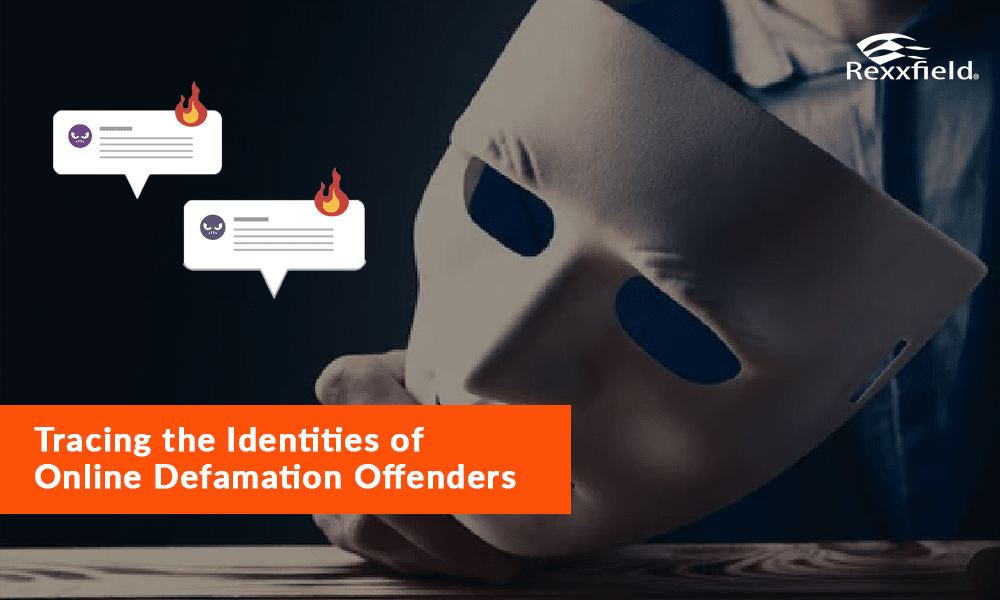How Cyber Crime Investigators Identify Online Defamation Offenders
The personal journey of our founder surviving a malicious online defamation campaign orchestrated by a narcissist was a tumultuous and devastating experience. It resulted in the ruination of a business, unemployment for staff, and unpaid vendors. However, through resilience and a stroke of providence, our founder transformed this adversity into an opportunity by merging expertise in information technology security, forensics, and battling libelous attacks on personal character. This fusion gave birth to “Rexxfield.”
Our cyber crime investigators specialize in identifying online defamation offenders and other online perpetrators.
“Since early 2008 Rexxfield has successfully and positively identified at least 80% of these backbiting miscreants for victimized clients and pro bono hardship cases”.
Uncovering Digital Footprints and Analyzing Metadata:
Every online interaction leaves behind a digital footprint that can be analyzed to identify anonymous online defamation offenders. Our Digital Forensics Investigators utilize sophisticated techniques to extract and examine metadata associated with electronic communications, such as IP addresses, timestamps, and user agent data. These invaluable pieces of information serve as a trail of clues, aiding in tracing the origin and activities of these individuals.
Tracing Networks and IP Addresses:
Our team of cyber crime investigators is equipped with effective methods to positively identify the IP addresses and capture relevant user data of the perpetrators. These techniques are completely legal, admissible in court, and compelling in building a strong case against the trolls.
VPN
When dealing with individuals engaged in malicious activities and harassment, it is not uncommon for them to employ technical measures to hide their identities. Proxy servers, VPN services, and the Tor Network are often utilized to mask their true IP addresses, making it challenging to obtain usable data about these antagonists. Even major search engines like Google may not have access to the real IP addresses of users hiding behind such technologies. However, our team of experienced cyber investigators possesses the expertise to overcome these obstacles and uncover the true identities of individuals.
Collaborating with Tech Companies:
If cyber crime investigators can’t trace an IP address, we will work with lawyers and tech companies to obtain information that is vital in unmasking anonymous online defamation offenders. Tech companies can provide valuable assistance by sharing user information, metadata, IP addresses, and other relevant data within legal frameworks and data protection regulations. This collaboration streamlines the investigation process, significantly enhancing the chances of identifying and apprehending these offenders.
Why we prefer to trace IP addresses through our proprietary software, is because it is cheaper and faster than serving tech companies with a subpoena. To serve a subpoena, a lawyer needs to file a civil suit. Then tech companies will often notify their user of the production request to give them 30 days to challenge the subpoena.
If law enforcement issues the subpoena, no civil suit is needed, and tech companies will return the requested information much faster.
However, sometimes subpoenas are inevitable and we prepare subpoenas for our clients and lawyers.
Fostering International Cooperation and Mutual Legal Assistance:
The borderless nature of the internet necessitates international cooperation in tracing anonymous online defamation offenders. Law enforcement agencies work closely with their counterparts in different jurisdictions, exchanging information and leveraging mutual legal assistance treaties. Overcoming legal barriers, this collaboration enables investigators to track down offenders who may attempt to conceal their activities across different countries.
Our cyber crime investigators have contact with law enforcement all over the world, which enables us to help victims worldwide.
By harnessing the power of digital footprints, cyber forensics, network analysis, cooperation with tech companies, and international collaboration, efforts to identify anonymous online defamation offenders are being strengthened. These comprehensive approaches are instrumental in empowering online defamation victims and ensuring that these individuals are held accountable for their actions, fostering a safer online environment for all.
Contact our cyber crime investigators
The Impact of Online Defamation
In the digital age, the pervasive nature of online communication has given rise to a concerning phenomenon: online defamation. The act of spreading false and harmful information about individuals or entities on the internet can have a profound impact, not only on the reputation of the victims but also on their personal and professional lives. The repercussions of online defamation extend far beyond the virtual realm, leaving lasting scars and far-reaching consequences.

Professional Consequences: The impact of online defamation can extend into the professional realm, jeopardizing careers and livelihoods. False and damaging information can dissuade potential employers from hiring affected individuals, limit professional opportunities, and even lead to job loss. The reputation of businesses and organizations can also suffer, resulting in loss of clients, decreased sales, and long-term damage to their brand.
Psychological and Emotional Toll: Being subjected to online defamation can have a devastating psychological and emotional toll on the victims. They may experience feelings of shame, humiliation, anxiety, and depression. The constant fear of judgment and further attacks can erode their self-esteem and overall well-being. The anonymous nature of the internet often exacerbates these emotional wounds, as victims may struggle to identify and confront their attackers.
Legal Battles and Financial Burden: Victims of online defamation often face the arduous task of seeking legal recourse to protect their rights and restore their reputation. Defamation laws vary across jurisdictions, making legal battles complex and costly. Initiating legal action against anonymous online perpetrators can be particularly challenging, requiring extensive efforts to trace their identities. The financial burden of legal proceedings further adds to the stress and hardship experienced by the victims.
Social and Community Impact: Online defamation not only affects individuals but can also harm communities and society as a whole. The spread of false information and malicious content erodes trust, undermines social cohesion, and fosters a toxic online environment. It can lead to the creation of online echo chambers, where misinformation thrives, and healthy discourse is stifled. The collective impact of online defamation poses a broader challenge to digital communities and the overall well-being of individuals within them.
Efforts to mitigate the impact of online defamation require a multifaceted approach. Strengthening legal frameworks to address online defamation, promoting digital literacy and responsible online behavior, and fostering a culture of empathy and respect in online interactions are crucial steps. Collaboration between online platforms, law enforcement agencies, and civil society organizations is essential to combat online defamation effectively and protect the rights and well-being of individuals in the digital space.
Ultimately, addressing the impact of online defamation requires a collective effort to create a safe and inclusive online environment, where individuals can express themselves freely without fear of harm, and where the damaging consequences of false information are mitigated.
Can Businesses File Defamation Lawsuits?
Absolutely! Businesses possess the same rights as individuals when it comes to pursuing defamation claims. In fact, they may even have additional avenues available to them to seek damages and remedies that are specific to the business realm, going beyond the traditional laws governing libel.
There are two common types of defamation claims that businesses can make:
- Injurious Falsehood: This refers to the act of business disparagement, where false statements are made about a company or its products/services, resulting in harm to its reputation or economic standing. Injurious falsehood claims focus on false statements specifically targeted at damaging the business.
- Unfair or Deceptive Trade Practices: Businesses may also have grounds to pursue claims based on unfair or deceptive trade practices. These claims generally involve false or misleading statements made in the course of business, which can harm the reputation of the business and its ability to compete in the market.
By filing defamation lawsuits, businesses aim to restore their reputation, seek compensation for damages incurred, and deter others from engaging in similar harmful practices. It is important to consult with legal professionals well-versed in defamation laws to understand the specific requirements and procedures involved in pursuing a defamation claim as a business entity.
Ultimately, businesses have the right to protect their reputation and seek justice in cases where false statements or deceptive practices have caused harm.
Where and How People and Businesses are Defamed
Online defamation can occur across various platforms and mediums on the internet. Here are some common places where online defamation takes place:
Social Media Platforms: Social media platforms, such as Facebook, Twitter, Instagram, and LinkedIn, are popular spaces for individuals to express their opinions and engage in discussions. However, these platforms can also become breeding grounds for online defamation. False accusations, malicious rumors, negative reviews, and personal attacks can spread rapidly through posts, comments, and direct messages.
Review Websites: Websites dedicated to hosting user-generated reviews, such as Yelp, TripAdvisor, and Google Reviews, can be susceptible to online defamation. Disgruntled customers or competitors may post false or exaggerated negative reviews to harm the reputation of businesses or individuals.
Online Forums and Discussion Boards: Online forums and discussion boards provide spaces for individuals to exchange information and engage in conversations on various topics. However, these platforms can also become platforms for online defamation when users engage in character assassination, spread false information, or engage in personal attacks.
Blogging Platforms: Blogging platforms, like WordPress and Blogger, allow individuals to share their thoughts and opinions with a wider audience. While most bloggers use these platforms responsibly, instances of online defamation can occur when individuals use their blogs to defame or slander others.
Email and Messaging Platforms: Online defamation can also take place through email exchanges and messaging platforms. Individuals may send defamatory messages or spread false information about others privately or within groups.
It’s important to note that online defamation can occur in various forms, including written content, images, videos, and audio recordings. The widespread availability of the internet and the ease of sharing content contribute to the proliferation of online defamation across different platforms and mediums.
To address online defamation effectively, it is crucial for platform providers to enforce policies against defamatory content and provide mechanisms for reporting and removing such content. Additionally, individuals should be cautious about the information they share online, critically evaluate sources before believing or sharing information, and be mindful of the potential consequences of their online actions.
Conclusion
In conclusion, online defamation can have devastating consequences for individuals and businesses alike, tarnishing reputations, causing emotional distress, and even leading to financial losses. The proliferation of the internet and social media platforms has given rise to an increase in cases of defamation, making it crucial to address this issue head-on.
However, there is hope for relief and justice. By leveraging the expertise of cyber investigators, it is possible to identify the perpetrators hiding behind the anonymity of the online world. Through diligent investigation and the use of advanced techniques, such as tracing IP addresses and uncovering digital footprints, it becomes possible to unmask those responsible for spreading false information and defamatory content.
Bringing the antagonist to court is a critical step towards finding justice. Legal action can not only hold the perpetrators accountable for their actions but also provide a platform for the victims to present their case and seek appropriate remedies. From injunctive relief to financial compensation, the legal system offers avenues for individuals and businesses to recover from the harm caused by online defamation.


